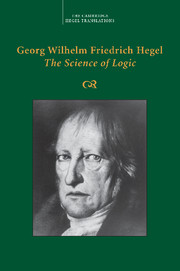Preface to the First Edition
Published online by Cambridge University Press: 30 September 2021
Summary
The complete transformation that the ways of philosophical thought have undergone among us in the past twenty-five odd years, the higher standpoint in self-awareness that spirit has attained in this period of time, has so far had little influence on the shape of the logic.
What was hitherto called “metaphysics” has been, so to speak, extirpated root and branch, and has vanished from the ranks of the sciences. Where are the voices still to be heard of the ontology of former times, of the rational psychology, the cosmology, or indeed, even of the natural theology of the past, or where are they allowed to be heard? Inquiries, for instance, into the immateriality of the soul, into mechanical and final causes – where is interest in them still to be found? Even the former proofs of God's existence are cited only out of historical interest, or for the purpose of edification and the uplifting of the mind. The fact is that interest, whether in the content or in the form of the former metaphysics, or in both together, has been lost. Remarkable as it is if a people has become indifferent, for instance, to its constitutional law, to its convictions, its moral customs and virtues, just as remarkable it is when a people loses its metaphysics – when the spirit engaged with its pure essence no longer has any real presence in its life.
The exoteric teaching of the Kantian philosophy – that the understanding ought not to be allowed to soar above experience, lest the cognitive faculty become a theoretical reason that by itself would beget nothing but mental fancies – this was the justification coming from the scientific camp for renouncing speculative thought. In support of this popular doctrine there was added the cry of alarm of modern pedagogy, that the pressing situation of the time called for attention to immediate needs – that just as in the ways of knowledge experience is first, so for skill in public and private life, exercise and practical education are the essential, they alone what is required, while theoretical insight is even harmful. – With science and common sense thus working hand in hand to cause the downfall of metaphysics, the singular spectacle came into view of a cultivated people without metaphysics – like a temple richly ornamented in other respects but without a holy of holies.
- Type
- Chapter
- Information
- Georg Wilhelm Friedrich Hegel: The Science of Logic , pp. 7 - 11Publisher: Cambridge University PressPrint publication year: 2010



